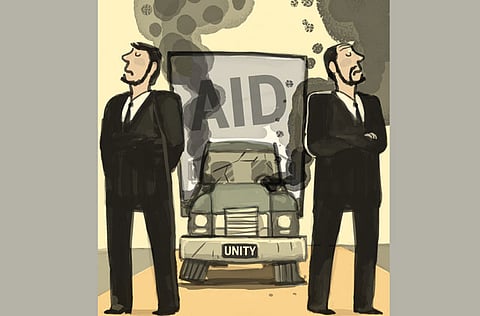Palestinians must avoid a divisive trap
Gaza deserve all kinds of aids and support, but Palestinian unity deserves more

From the black years of the Leban-ese civil war comes a tale that reveals the real nature of a statesman. As Beirut was a divided city, it so happened that power stations were in the eastern part of the city. So the people of west Beirut had to pay the price — darkness and blackouts.
From the heart of darkness, ordinary people and many politicians thought that the solution would be to build new power stations in the western part of the city. They were pushing the then Lebanese prime minister, Dr Saleem Al Hoss, to build power stations in west Beirut.
Ostensibly, it was a very legitimate and logical demand, one that could alleviate the suffering of the people in west Beirut. However, Al Hoss refused persistently to do so even when he was threatened by some of his cabinet members. The man said that if he built power stations in west Beirut, it would further contribute to the division of Beirut.
That was in the mid 1980s. At that time, neither Al Hoss nor any Lebanese person would have dared to think that Beirut would unite again and the civil war would end. So what made Al Hoss refuse to take a step that could have helped him gain popularity? What kind of belief was motivating him to oppose what looked like a very legitimate demand from a lot of people?
Since 2007, Palestinian land has been divided between two rival Palestinian factions — Gaza dominated by Hamas and West Bank by Fatah. I would never say that one of the two parts is better than the other or this part deserves aid and support, not the other.
Gaza, which has been under an Israeli siege since 2007, deserves all kinds of support and the brutal siege should end. But for this to happen, many might think exactly like those in Lebanon, who had thought about solving a problem in part by contributing to divisions of their own capital.
The visit of the Emir of Qatar to Gaza, two weeks ago, reminded one of the story of west and east Beirut in those black years of the Lebanese civil war. Apart from that, aid trucks crossed the Egyptian-Palestinian border and there was an announcement of $400 million (Dh1.47 billion) in aid to the besieged Strip, The Emir called on both the Palestinian National Authority (PNA) and Hamas to work together for unity.
For me and many others, a very logical question is: Why didn’t he continue his move and visit Ramallah to meet the PNA President, Mahmoud Abbas? At least that would have fulfilled the two aims of the visit — standing by the people of Gaza and garnering support for Palestinian unity.
There have been many reports and leaks about meetings with President Abbas in particular, saying that Abbas was supposed to meet the Emir in the first hours of his visit to Gaza, but declined it at the last moment under pressure from other Palestinian leaders. Well, it is not an issue if this is true or not. To me, it looks like a slip that further proves that the question about the long-awaited visit to Ramallah is absolutely logical.
This is exactly what makes fears of a Palestinian division so very tangible. The people of Gaza deserve all kinds of aid and support, but the Palestinian unity deserves more because it is the key to strengthening all Palestinians in their struggle against Israel by all means.
Unwanted consequences
Support to Palestinians should not be tailored on the basis of any Palestinian division. The people of Gaza deserve all the support like the Palestinians in the West Bank. Good intentions may lead to unwanted consequences, specially in politics and in fierce conflicts like the Arab-Israeli conflict in particular.
What is left now is only a reproduction of that old, destructive Palestinian tale of “resistance and betrayal” — “resistor” Hamas and “armistice” Fatah. What we see now after the visit (actually since 2007) is just a distorted restoration of an old chapter in the long history of Palestinian struggle.
Just remember the late Yasser Arafat and his long story with rival Palestinian leaders. When he was alive, all that he got was defamation, but when he passed away, all his rivals, including Hamas, called him a martyr.
As the Palestinian unity is delayed — and Hamas leaders are delighted with the new situations in countries like Egypt and Tunisia and as the leaders in these two countries talk only about aiding Gaza — one hopes that Hamas leaders will not use the suffering of the people of Gaza as an excuse to consolidate their rule and ignore the bigger issue of Palestinian unity. If they fall into this trap, they will actually contribute to Palestinian division — exactly the kind that Al Hoss had avoided in Lebanon decades ago.
Mohammad Fadhel is a Bahraini writer and media consultant based in Dubai.



